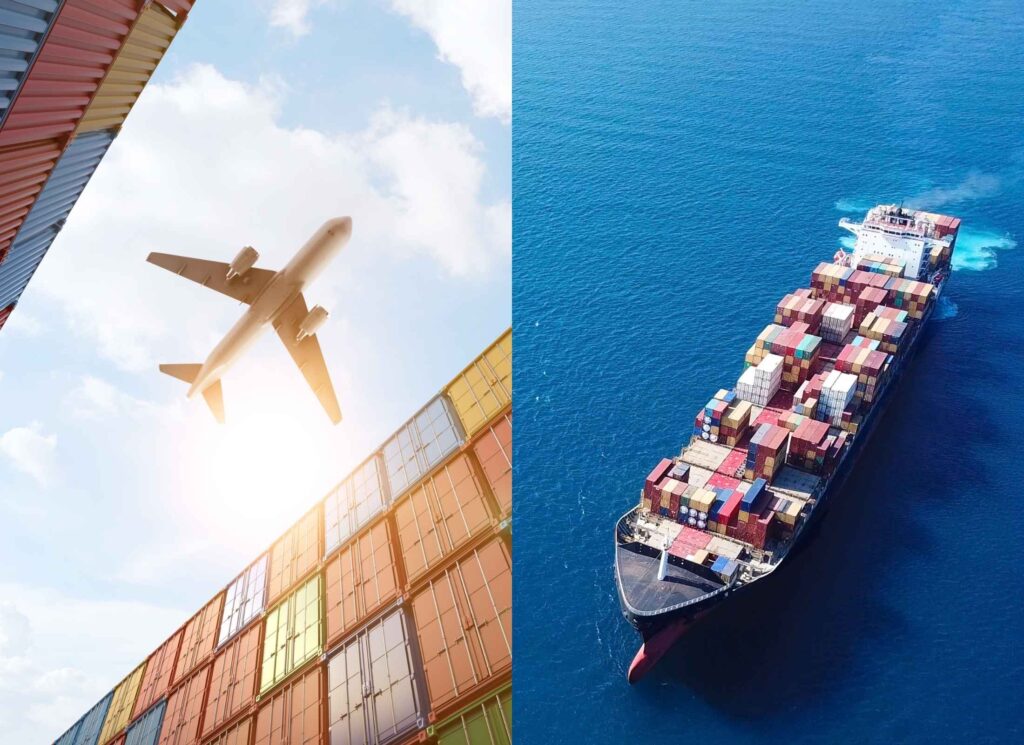- By TOP CHINA FREIGHT
- September 3, 2025
- Shipping
Table of Contents
Importing products via transport from China to Mexico is a common strategy for businesses seeking cost-effective goods. However, the process can be challenging due to fluctuating shipping rates, customs clearance, and complex international logistics. This guide explains everything you need to know about shipping from China to Mexico, including transportation methods, transit times, costs, documentation, and best practices for efficient supply chain management.

What Are the Main Shipping Methods from China to Mexico?
There are three primary methods for transporting goods from China to Mexico: sea freight, air freight, and express courier services.
| Shipping Method | Average Cost | Transit Time | Pros | Cons |
|---|---|---|---|---|
| Sea Freight (FCL/LCL) | $1,000–$3,500 per container | 25–40 days | Cost-effective for bulk shipments, large capacity | Slower, requires port handling |
| Air Freight | $5–$10 per kg | 3–7 days | Fast, ideal for urgent goods | Expensive, weight and volume limits |
| Express Courier | $10–$25 per kg | 5–10 days | Door-to-door, easy tracking | High cost for large volumes |
Tip:
Sea freight is best for large shipments, while air freight suits urgent or high-value cargo.
How Much Does It Cost to Transport Goods from China to Mexico?
Costs depend on shipment size, weight, and type of cargo.
| Container Type | Cost (USD) | Suitable Cargo |
|---|---|---|
| 20ft Container | $1,000–$1,800 | Medium shipments |
| 40ft Container | $1,800–$3,500 | Large shipments |
| LCL (Less than Container Load) | $60–$160 per cubic meter | Small or partial shipments |
What Factors Affect Shipping Costs?
Heavier and larger shipments cost more.
Fluctuations in fuel prices affect freight charges.
Shanghai, Ningbo, or Shenzhen to Veracruz or Lázaro Cárdenas impact frequency and reliability.
Chinese New Year and peak seasons increase costs.
Typical Transit Time from China to Mexico
Transit time varies by method and ports:
| Route | Transit Time | Notes |
|---|---|---|
| Shanghai to Veracruz | 28–35 days | Sea freight, reliable schedule |
| Shenzhen to Lázaro Cárdenas | 25–32 days | Sea freight, frequent sailings |
| Beijing to Mexico City | 3–7 days | Air freight, fast but costly |
Tip:
Factor in inland transport in Mexico to optimize overall delivery time.
Which Documents Are Required for Shipping from China to Mexico?

Accurate documentation is essential to avoid customs delays:
| Document | Purpose |
|---|---|
| Commercial Invoice | Declares value, buyer/seller info |
| Packing List | Details content, weight, dimensions |
| Bill of Lading (B/L) | Proof of sea shipment |
| Air Waybill (AWB) | Proof of air shipment |
| Certificate of Origin | Confirms product origin |
| Import License | Required for regulated goods |
| Insurance Certificate | Protects cargo against loss/damage |
Tip:
A trusted freight forwarder can ensure all documents meet Mexican customs requirements.
Air Freight vs Sea Freight: Which Should You Choose?

Sea Freight:
- Pros: Economical for bulk shipments
- Cons: Slower, requires port handling
Air Freight:
- Pros: Fast, ideal for urgent shipments
- Cons: Expensive, limited in weight and volume
Case Study:
A Mexican electronics retailer shipped 300 units via air freight. The cost was 35% higher than sea freight, but delivery occurred in 5 days, preventing stock shortages during peak season.
How Can a Freight Forwarder Help?
A China freight forwarder simplifies the shipping process by:
- Handling documentation and customs clearance
- Optimizing costs via consolidation or FCL negotiation
- Providing real-time shipment tracking
- Ensuring legal and regulatory compliance
Benefits of Consolidated (LCL) Shipping
For smaller shipments, LCL (Less than Container Load) is cost-efficient:
| Benefit | Explanation |
|---|---|
| Lower Costs | Share container space, pay only for your cargo |
| Flexibility | Ship small quantities without a full container |
| Eco-Friendly | Fewer shipments reduce carbon footprint |
Tip:
Compare LCL vs FCL based on monthly shipment volume for maximum cost efficiency.
How to Track Shipments from China to Mexico
Modern shipping allows real-time tracking via:
- Forwarder online portals
- Air Waybill (AWB) numbers for air freight
- Courier tracking for express shipments
Tip:
Tracking helps anticipate delays and manage warehouse logistics in Mexico efficiently.
Common Challenges When Shipping from China to Mexico
Missing or incorrect documentation
Port congestion, weather, or logistics bottlenecks
Seasonal rates and fuel surcharges
Improper packaging or handling
Example: Shipping Furniture from Shanghai to Veracruz
| Parameter | Details |
|---|---|
| Shipment Type | FCL 40ft container |
| Cargo | 150 wooden furniture pieces |
| Cost | $2,500 including customs and insurance |
| Transit Time | 30 days |
| Outcome | Delivered on time, no customs issues |
This demonstrates how a reliable freight forwarder and proper planning ensure safe, cost-effective shipments.
Conclusion
Shipping from China to Mexico requires careful planning, accurate documentation, and the right shipping method. Working with a trusted freight forwarder, understanding sea vs air freight options, and planning shipments strategically helps reduce costs, avoid delays, and ensure smooth delivery. Whether importing electronics, furniture, or industrial products, the correct logistics strategy guarantees timely, reliable supply chain operations.
Need a Shipping Quote?
If you want expert guidance and peace of mind, our team is ready to assist.
TJ China Freight offers tailored solutions to help businesses of all sizes ship more reliably from China.

FAQs
Q1:How long does it take to ship from China to Mexico?
Transit time depends on method. Sea freight: 25–40 days, air freight: 3–7 days, express: 5–10 days. Planning ahead helps avoid delays.
Q2:Can I ship restricted goods from China to Mexico?
Yes, but you must check Mexican import regulations first. Certain items like chemicals, electronics, and pharmaceuticals may require special licenses or permits. A licensed freight forwarder can help ensure compliance and avoid customs penalties.
Q3:How do I calculate customs duties for shipments from China?
Customs duties are based on product category, declared value, and applicable Mexican tariffs. Using a freight forwarder or customs broker helps estimate total import taxes accurately and prevents surprises at the port.
Q4:Is insurance necessary for shipping from China to Mexico?
While not mandatory, cargo insurance is highly recommended. It protects against loss, theft, or damage during transit. Most forwarders offer coverage options tailored to shipment type and value.
Q5:Can I combine multiple suppliers’ shipments into one container?
Yes, this is called LCL (Less than Container Load). It allows multiple smaller shipments to share one container, reducing overall cost. Your forwarder handles consolidation and ensures proper documentation for each supplier.
